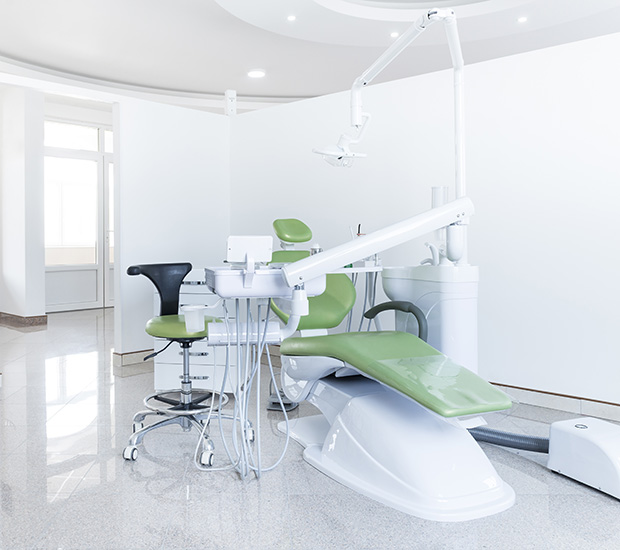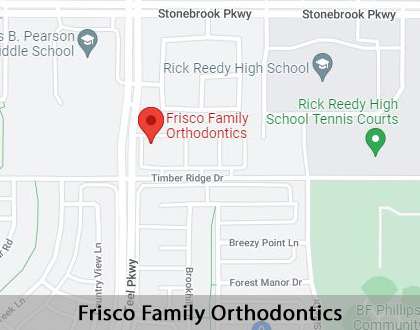Find an OrthodontistFrisco, TX
Finding the right orthodontist can make all the difference when it comes to oral health. Orthodontic treatment can enhance the appearance of your teeth and improve one’s overall dental health throughout their life. Orthodontic care consists of consultations, examinations, diagnoses, and treatment.
An orthodontist is available at Frisco Family Orthodontics and the surrounding area. Our team is skilled in providing optimal orthodontic care and treatment. We look forward to being there along your smile journey. To find out how orthodontic treatment can help or to schedule an appointment, call us at 214-771-7178.
The Importance of Orthodontics for Children
According to the American Association of Orthodontists, it is crucial to get an orthodontist check-up for children no later than 7 years of age. Orthodontists can detect subtle problems with jaw growth and emerging permanent teeth while some baby teeth are still present. Even if children's teeth appear to be straight, the orthodontist could identify a developing problem in the growth and development of their teeth and recommend early treatment that could prevent more serious issues from developing at a later age.
With early evaluation, an orthodontist could provide treatment in less time and prevent further complications:
- Guide a child’s developing jaw growth and permanent teeth in more favorable positions
- Correct harmful oral habits, like thumb-sucking and pacifier use
- Improve the bite and the way the lips meet
- Correct protruding teeth
Orthodontists receive the same training as dentists, which includes college for a pre-dentistry or pre-medical degree before going on to a graduate school of dentistry. Orthodontists then receive additional education to specialize in diagnosing and treating misalignments of the teeth and jaw. It is helpful to think of a dentist as a general practitioner and an orthodontist as a specialist.
“Even if children’s teeth appear to be straight, the orthodontist could identify a developing problem in the growth and development of their teeth and recommend early treatment that could prevent more serious issues from developing at a later age.”
When to See an Orthodontist
If a parent notices any developmental issues with a child's teeth, then they should schedule an appointment with an orthodontist. Other potential growth issues may be more challenging to recognize, such as difficulty biting or chewing, protruding teeth or lips, and emerging crowded teeth. Take notice if a child is clenching or grinding their teeth, hiding their smile, or unable to close their lips over their teeth. It is critical to have these problems treated as early as possible for the best results.
When a child is growing, an orthodontist can begin treatment known as "interceptive orthodontics." This means intercepting problems before they grow more serious. Interceptive orthodontics is usually performed on children between the ages of 7 and 11 when the first set of permanent molars are generally in, and the teeth, jaw, and gums are extremely pliable.
Orthodontics may include:
- Maintaining space where a baby tooth has been lost, and other teeth drift into the site
- Using expanders or limited braces to facilitate upper and lower expansion to correct crossbite and create space
- Reducing protrusion for overbites to reduce the risk of injury to children’s front teeth
- Advising on stopping thumb-sucking and pacifier use
- Removing over-retained primary teeth that are in the way of an ideal eruption of coming adult teeth
“When a child is growing, an orthodontist can begin treatment known as interceptive orthodontics.”
Finding the Right Orthodontist
Finding the right orthodontist may involve visiting several orthodontists and researching their practices online to find one with whom the patient or child is most comfortable. A good match will be an orthodontist who is compatible with their individual personality and specific needs. In addition, many orthodontists specialize in a particular age group (children, adolescents, or adults) which could also help narrow down the search.
To evaluate the orthodontist's credentials, look for the American Association of Orthodontists (AAO). Only orthodontic specialists can belong to the AAO. Orthodontists often have bios on medical sites in which patients can read about them and their practice as well as other patient reviews.
“Finding the right orthodontist may involve visiting several orthodontists and researching their practices online to find one with whom the patient or child is most comfortable.”
Check out what others are saying about our dental services on Yelp: Find an Orthodontist in Frisco, TX
What Resources to Use
Ask a dentist for a referral and get word-of-mouth referrals from other patients, family, and friends. Note how busy the orthodontists' offices are; a busy practice with many parents and children in the waiting room shows that the orthodontist has earned a popular following. Check with an insurance carrier to find orthodontists who are in the network.
Most orthodontists offer initial meetings and evaluations free of charge to get expert advice about treatment needs, options, and timing. Find out whether an orthodontist is using the latest technology in correcting a child's smile. Locate orthodontists and reviews on the AAO website or other online healthcare sites.
“Most orthodontists offer initial meetings and evaluations free of charge to get expert advice about treatment needs, options, and timing.”
Questions Answered on This Page
Q. How will I know to pursue orthodontic treatment for my child?
Q. How can an orthodontist treat issues with my child's dental development?
Q. What should I be looking for in an orthodontist?
Q. How can I find the right orthodontist?
Q. What questions should I ask when choosing the right orthodontist?
People Also Ask
Questions to Ask a Potential Orthodontist
When meeting with a prospective orthodontist, an individual will want to be equipped with some questions that help with making a decision:
- Are you board-certified?
- How much does orthodontic treatment cost at your practice?
- Which insurance coverages do you accept?
- How will you approach treatment?
- What technology do you use for treatment?
- How long do you think my child’s treatment will last?
- Do you guarantee your results?
- Will my child require any additional care, such as a retainer?
The orthodontist will also likely ask questions about the patient’s hopes upon completing treatment and questions related to their current oral health habits and status. This can help the patient come up with other questions pertaining to their unique case and preferences.
“When meeting with a prospective orthodontist, an individual will want to be equipped with some questions that will help people make a decision.”
Frequently Asked Questions
Q. When should I look into orthodontic care for my child?
A. According to the American Association of Orthodontists, it is essential to get an orthodontist check-up for a child no later than age 7. This is because orthodontists can detect subtle problems with jaw growth and emerging permanent teeth while some baby teeth are still present.
Q. What dental issues warrant attention from an orthodontist?
A. Crooked teeth, crowded teeth, poor bite (malocclusion), overbite or underbite, asymmetrical jaw growth, and more issues often require orthodontic treatment. A dentist can advise on their observations and recommend orthodontists who could provide treatment. However, some patients prefer finding an orthodontist on their own and getting evaluated directly.
Q. What kinds of treatment could an orthodontist offer?
- Correcting space issues when permanent teeth start coming in while baby teeth are still present
- Using expanders or limited braces to facilitate upper and lower expansion to correct a crossbite
- Reducing protrusion for overbites
- Stopping thumb-sucking and pacifier use
- Many more treatment options exist depending on a child’s specific issues
Q. How long will my child have to wear braces?
A. The length of time wearing braces can vary from person to person. However, most children wear braces between one and three years, followed by a retainer to secure the teeth in position.
Q. What types of orthodontic treatments are available?
A. Orthodontic treatments consist of teeth-straightening appliances such as traditional metal braces, ceramic (tooth-colored) braces, and clear aligners. Orthodontics can also include treatments that help correct irregular or improper jaw placement.
Quality Orthodontic Services Can Transform Smiles
By visiting us as soon as possible, our team can help get you the professional treatment you need.
Definition of Orthodontic Terminology
Learn More About How to Find an Orthodontist
If a parent notices any developmental issues with a child's teeth, then they should schedule an appointment with an orthodontist. Early evaluation by an orthodontist could identify a developing problem in children's growth and development and recommend early treatment that could prevent more severe problems from developing at a later age.
Orthodontists also treat adolescents and adults to help improve their oral function and appearance. It is never too late to get the smile you want or enhance your current oral health. Get orthodontic treatment today by a qualified specialist. Call 214-771-7178 to learn more or schedule an appointment.
Helpful Related Links
- American Dental Association (ADA). Glossary of Dental Terms. 2021
About our business and website security
- Frisco Family Orthodontics was established in 2004.
- We accept the following payment methods: Cash, Check, MasterCard, and Visa
- We serve patients from the following counties: Denton County and Collin County
- We serve patients from the following cities: Frisco, Prosper, Allen, Carrollton, Corinth, Plano, Savannah, Little Elm, The Colony, Lewisville, and Celina
- Norton Safe Web. View Details
- Trend Micro Site Safety Center. View Details
Back to top of Find an Orthodontist







